Key takeaways:
- Building trust with vulnerable populations requires an empathetic approach, acknowledging historical injustices and fostering open dialogue.
- Ethical considerations, including informed consent and transparency, are essential in creating a respectful and collaborative research environment.
- Effective communication, using accessible language and active listening, enhances participant engagement and validates their concerns.
- Sharing research findings responsibly with participants and the broader community reinforces trust and honors their contributions to the study.
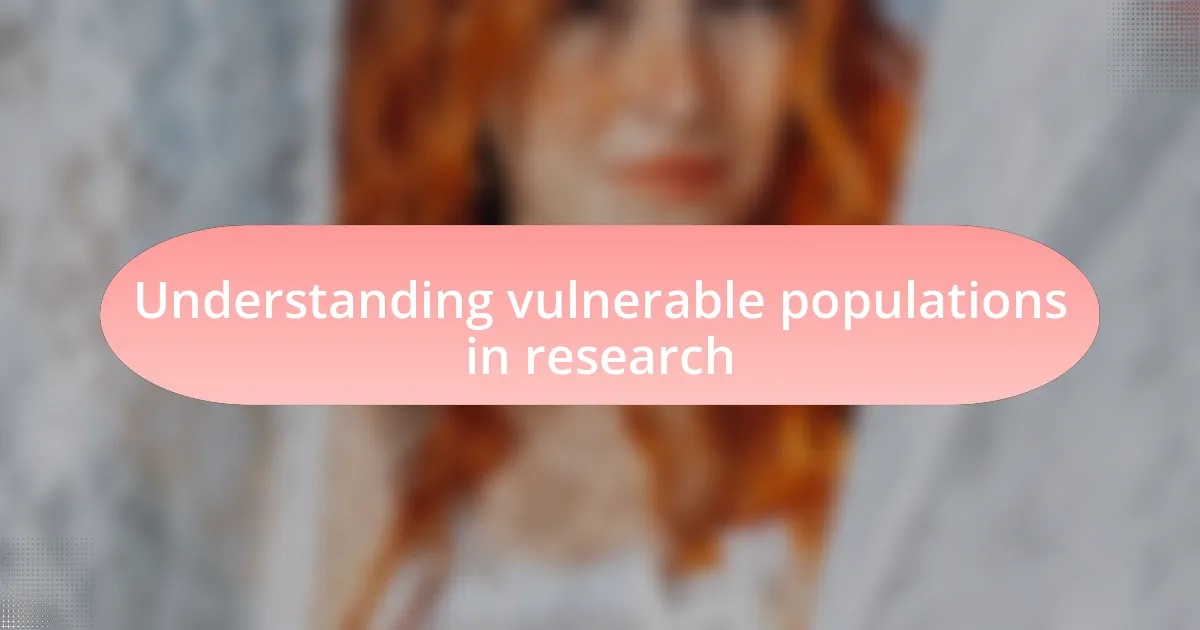
Understanding vulnerable populations in research
When I think about vulnerable populations in research, I can’t help but reflect on the myriad of factors that can place individuals at a disadvantage. For instance, individuals with cognitive impairments may struggle to fully understand the research process, raising questions about informed consent. Have you ever considered how a simple decision can feel monumental when one doesn’t have complete clarity on the implications?
During my time working in community health, I encountered participants from underserved backgrounds who hesitated to engage in studies due to past experiences of exploitation. It struck me how crucial it is to build trust, ensuring these communities feel secure and valued. When we approach research ethically, it’s about more than just following protocols; it’s about bridging gaps and acknowledging the unique challenges these individuals face.
Engaging with these populations requires an empathetic lens, something I have learned through countless interactions. I recall a participant who shared how her health struggles were compounded by systemic barriers, which made the idea of enrolling in research daunting. Listening to her story reinforced for me the importance of creating an inclusive environment where everyone has a voice, and ensures that research truly reflects the needs of diverse communities.

Importance of ethical considerations
Ethical considerations in research play a critical role in safeguarding the dignity and rights of vulnerable populations. I recall a situation where a participant’s hesitance to share their health issues stemmed from previous betrayals in a clinical setting. This experience illustrates how ethical frameworks are not just guidelines, but essential tools for creating an environment where individuals feel respected and safe.
Moreover, the importance of transparency cannot be overstated. I remember a research project where clear communication of risks and benefits led to greater participation from community members who typically mistrusted researchers. When potential participants feel informed, it builds a foundation of trust and encourages them to engage in the research process. How can we expect the necessary collaboration without first establishing open channels of communication?
In my experience, prioritizing ethics isn’t merely a box to check; it fosters a culture of respect that enhances the quality of data collected. When I think back to those who opened up about their vulnerabilities, it’s clear that ethical considerations empower individuals, transforming them from mere subjects into active contributors in research. This shift not only bolsters the integrity of our findings but also enriches the research landscape as a whole.
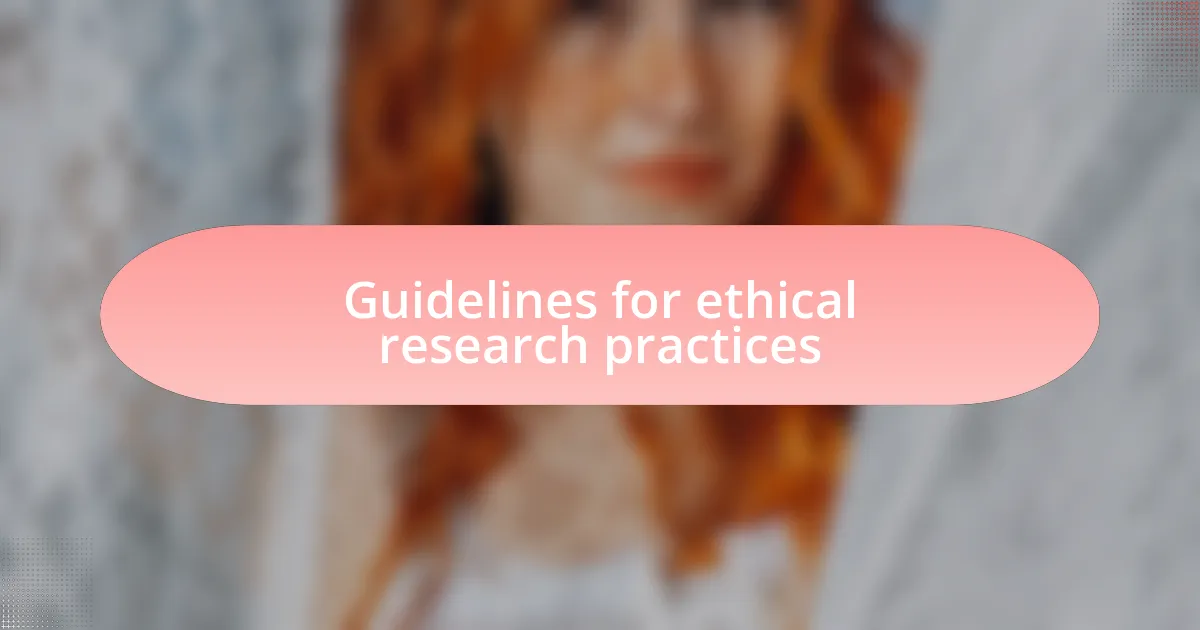
Guidelines for ethical research practices
Adhering to established ethical guidelines in research is essential for protecting vulnerable populations. I recall participating in a study that demanded comprehensive informed consent, ensuring that participants were fully aware of their rights. The sense of empowerment that came from this clarity was palpable; it made individuals feel valued rather than just a statistic in a data set. How can we expect active participation without first granting people the autonomy to make informed decisions?
Another important guideline is ensuring confidentiality and anonymity for participants. I often reflect on a community health project where we took extra steps to de-identify data, allowing participants to share sensitive information without fear of repercussion. This measure not only protected their privacy but also encouraged deeper disclosures, enriching the overall data collection. Isn’t it better when people feel safe to voice their experiences freely?
Lastly, I believe in establishing an ongoing dialogue between researchers and the communities involved. I once engaged in a feedback loop with participants, where their perspectives shaped the research focus and methodology. This collaboration not only built trust but also made the research more relevant to their lives. Why use a one-size-fits-all approach when the insights from those you’re studying can lead to more impactful outcomes?
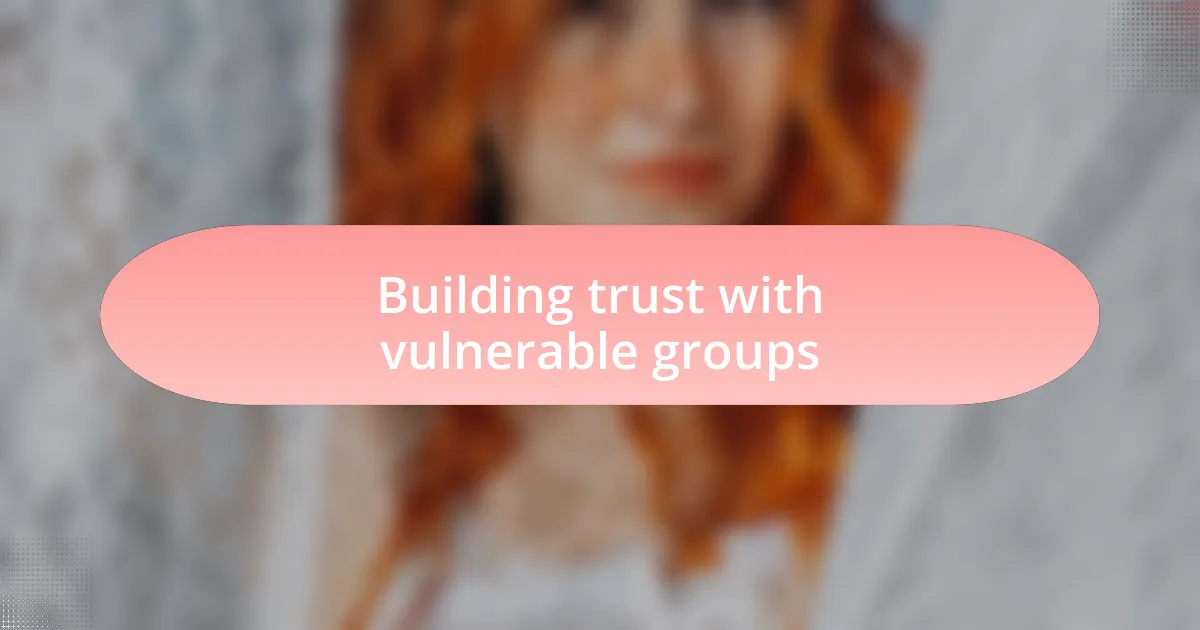
Building trust with vulnerable groups
Building trust with vulnerable groups requires a genuine commitment to understanding their unique experiences. I remember attending a community meeting where I listened to concerns about past research abuses. It struck me how deeply ingrained distrust can be when researchers fail to acknowledge historical injustices. Isn’t it our responsibility to learn from these past mistakes and prioritize honest, open conversations?
Establishing rapport also means being present in the community, not just conducting research from afar. During a health initiative, I volunteered alongside community members, helping them with day-to-day tasks. This hands-on approach created personal connections that fostered trust, making participants feel like valued partners rather than subjects. When we show up for people in tangible ways, it paves the road for deeper engagement.
Finally, transparency is key. In my experience, explaining the research process openly and inviting feedback helped dispel fears and misconceptions. I once held an information session where participants could ask questions about how their data would be used. Their relief was palpable; it transformed potential apprehension into a shared journey toward better health outcomes. Is it too much to ask for transparency to be a cornerstone of every research project?
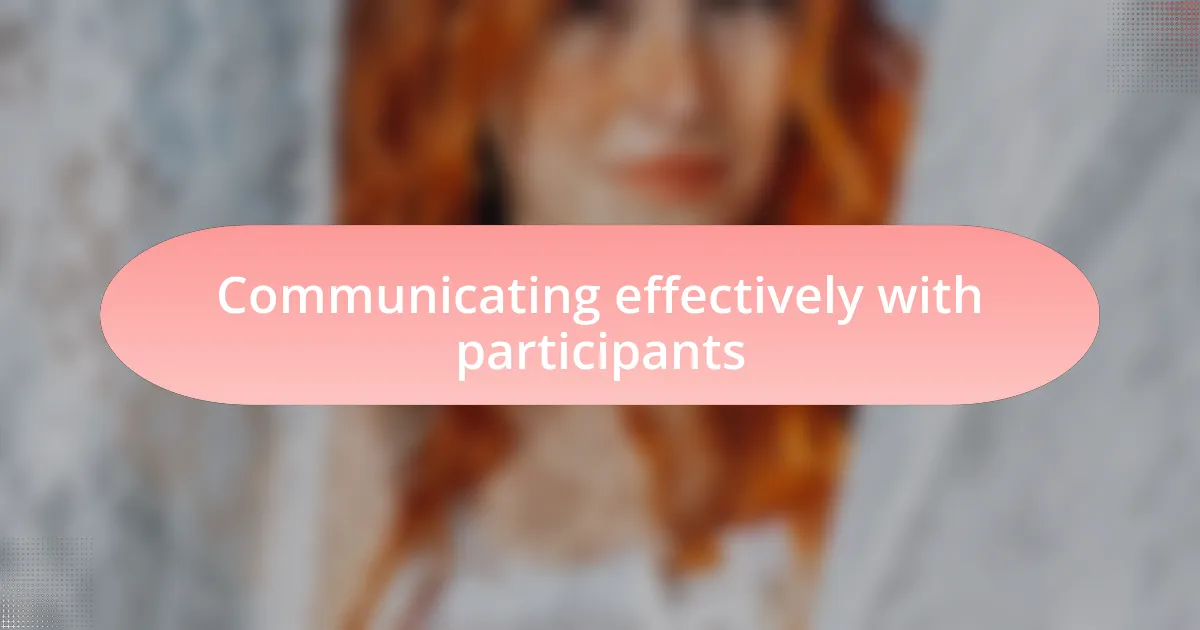
Communicating effectively with participants
When engaging with participants, I find that using clear, accessible language is crucial. In a recent focus group, I deliberately avoided medical jargon while explaining the study’s goals. I watched as participants’ faces relaxed, indicating they felt more comfortable asking questions and sharing their thoughts. Hasn’t effective communication always been about making sure everyone understands?
Active listening is another essential aspect of effective communication. I recall a time when a participant voiced her concerns about participating due to family pressures. Rather than brushing this aside, I made it a point to acknowledge her feelings and explore the issue further. This simple act of validation not only strengthened our relationship but also encouraged her to express more about her situation. How often do we, as researchers, pause to genuinely listen rather than just hear?
Finally, providing ongoing support throughout the study can make a significant difference in participant experience. I initiated regular check-ins via phone calls, which gave participants a chance to express any concerns or confusion during the process. It was heartening to hear how much they appreciated the effort; it transformed a transactional relationship into a collaborative partnership. Isn’t it our duty to ensure that participants feel supported every step of the way?
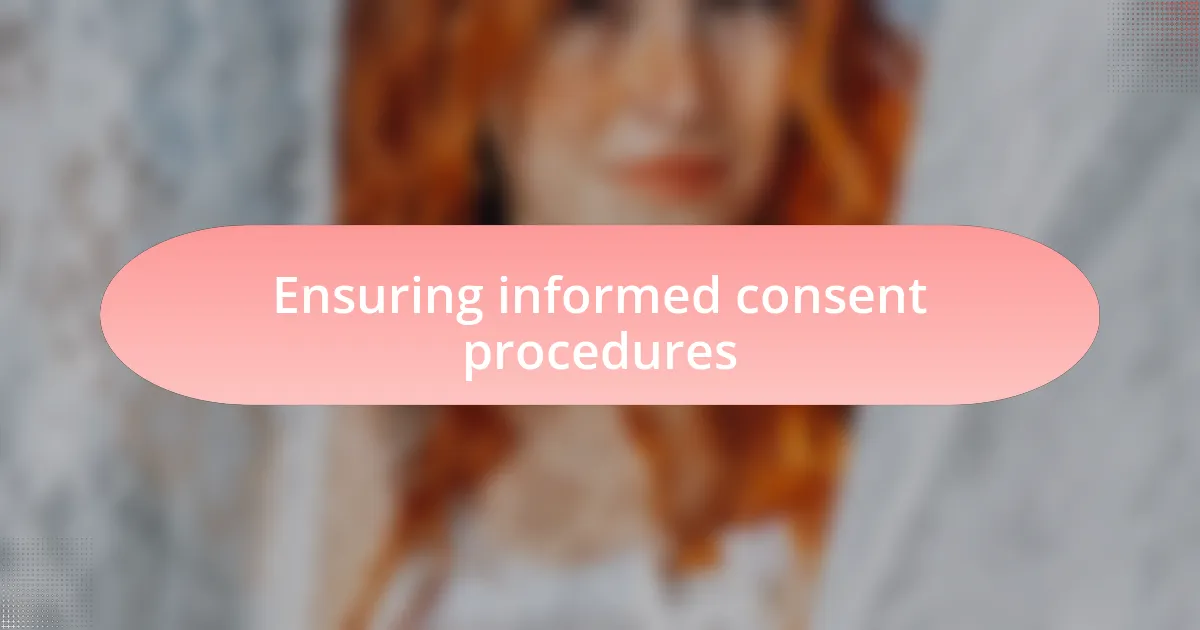
Ensuring informed consent procedures
Ensuring informed consent procedures is a fundamental aspect of ethical research, particularly when working with vulnerable populations. I recall a project where I led a team that had to navigate varying levels of comprehension among participants. We didn’t just hand out forms; instead, we organized one-on-one sessions where I walked through each section, inviting questions and clarifying points. The moment I witnessed a participant fully understanding their rights and feeling empowered to voice concerns was truly rewarding. Why shouldn’t every participant feel that level of engagement?
I always stress the importance of transparency during the consent process. On one occasion, a participant expressed hesitance about what would happen if they chose to withdraw from the study. I laid out the potential implications in a straightforward manner, making sure they knew that their choice would be respected without any penalties. This reassurance often transforms apprehension into trust, making participants feel safe and respected. Isn’t trust the foundation upon which ethical research stands?
Furthermore, I believe that informed consent should not be a one-time interaction but an ongoing conversation. In a recent study, I made it a point to revisit consent with participants as new developments arose, checking in to see if they were still comfortable with their involvement. This approach helped build a sense of agency over their participation, reminding me how vital it is to prioritize their autonomy throughout the research journey. Shouldn’t we always keep the lines of communication open?
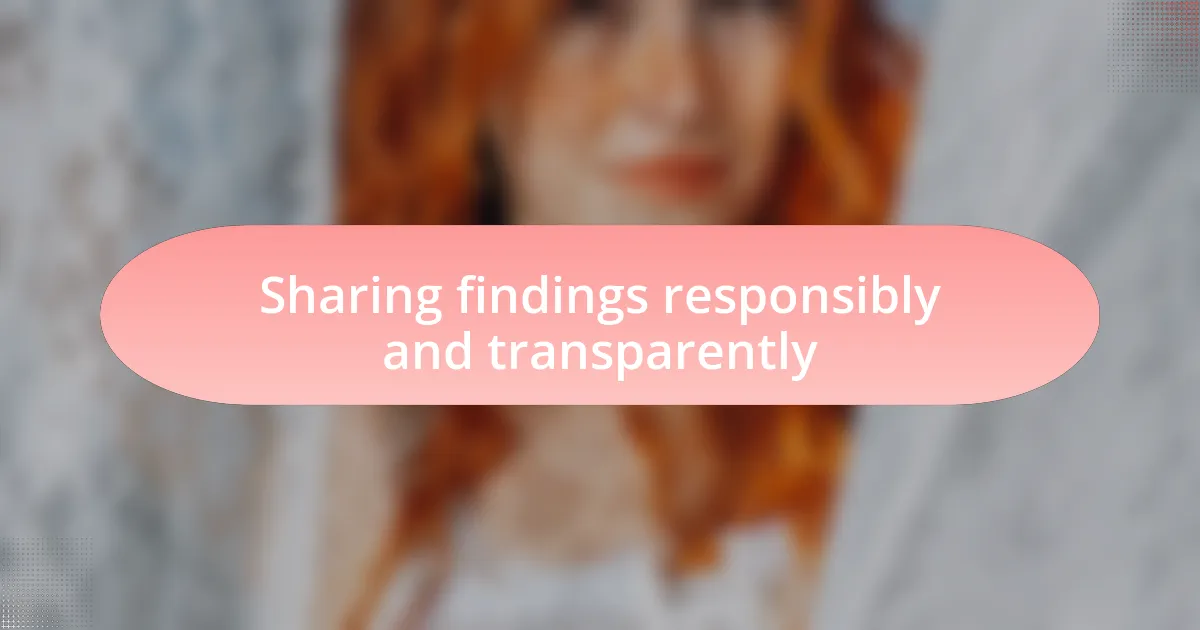
Sharing findings responsibly and transparently
Sharing findings with participants and the broader community is an ethical obligation that I take to heart. In one instance, after completing a study focused on health disparities, I organized a community forum to discuss our results. It was both exhilarating and nerve-wracking to lay our findings bare, but the feedback from community members was invaluable. They expressed gratitude for being included in the narrative, reminding me that sharing findings isn’t just about data; it’s about honoring the voices that contributed to that knowledge. How can we foster a spirit of collaboration without involving those we study?
I recognize that transparency in sharing research outcomes often builds a bridge of trust with vulnerable populations. During a project examining the impacts of a new treatment, we provided participants with a straightforward summary of our results, emphasizing not just the positive aspects but also the limitations. One participant told me that they appreciated our honesty, stating it made them feel respected as active partners rather than mere subjects. Doesn’t every individual deserve this level of clarity regarding the research that affects their lives?
It’s also crucial to consider the implications of sharing findings beyond immediate participants. After a study on mental health in marginalized communities, I collaborated with local organizations to ensure our findings reached those who could benefit. This partnership allowed us to communicate the results in a way that was relevant and useful. I learned that ethical responsibility extends to how we disseminate knowledge; it’s about ensuring that even those who aren’t part of the study can gain insights to inform their circumstances. Isn’t that what it means to genuinely elevate community knowledge?